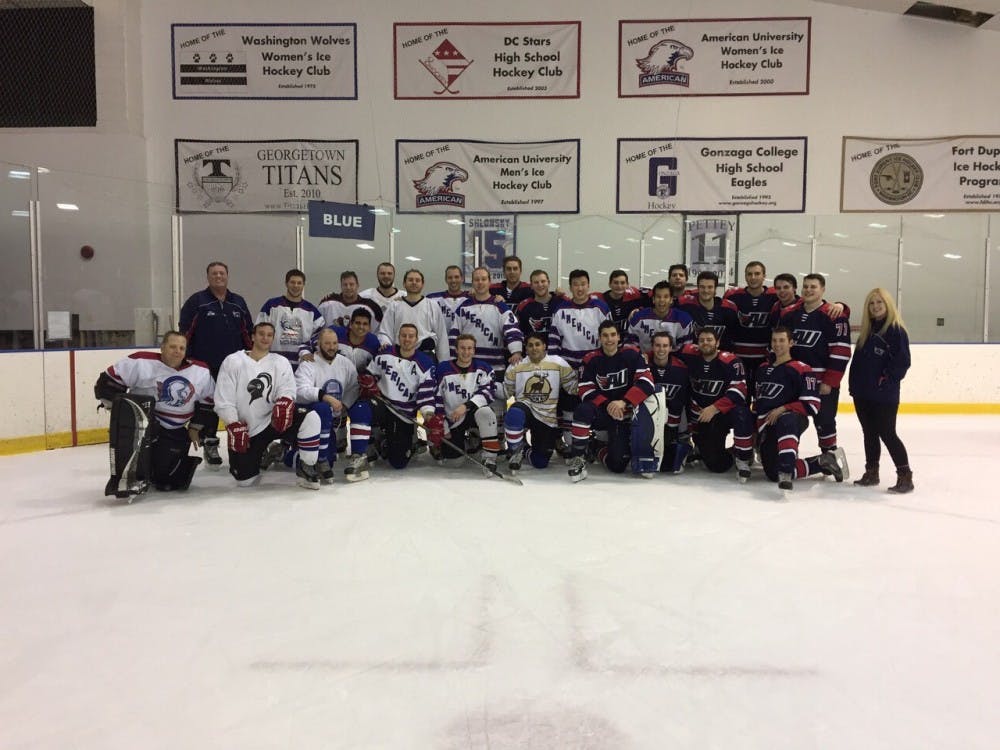After they were founded as the only women’s collegiate club ice hockey team in Washington, D.C., the Lady Eagles are no longer flying.
The women’s club hockey team is now dormant, leaving the University with only a men’s team. Dwayne Wilkerson, assistant director of club sports and intramurals, said that the University considers the women’s team to be inactive because they did not amass enough interest pay for ice time.
“The team attempted to keep practicing at Fort Dupont without a signed agreement or an approval from American,” Wilkerson said. “We had to tell them it wasn’t feasible to continue and try to practice when they have only five to six women.”
The American University Men's Club Ice Hockey team was founded in 2006 as a member of ACHA Division III. They won back-to-back Mason Dixon Collegiate Hockey Association championships in 2012 and 2013 before moving to the Blue Ridge Hockey Conference in 2014, now named the East Coast Collegiate Hockey Association.
The men’s team has 13 students on the roster this season and hosts practices at Fort Dupont Ice Arena (FDIA), Washington, D.C’s only indoor skating rink. The rink, located across the Anacostia River, is more than 11 miles from AU’s main campus.
Reserving ice time at the rink is typically $350 an hour, but is discounted to $275 after 10 p.m. This year, the men’s club team practices on Tuesday nights at 11:30 p.m. Hosting a home game costs them nearly $1000.
“We get some funding from the school,” said Ryan Siegel, president of AU Men's Club Ice Hockey. “The rest of it is coming from high member dues.”
Funding has been a problem for both the men’s and women’s team for the past several school years. Even before the women’s team became dormant, it struggled with the sufficient funds to hold practices.
“The last couple years, they were really getting by by the skin of their teeth,” Ty Newberry, executive director and general manager of Fort Dupont Ice Arena said.
FDIA has been run by the nonprofit Friends of Fort Dupont Ice Arena since 1996. They established the Kids on Ice program, which provides free and discounted skating lessons to children ages 5-18 years old who would not have the opportunity to skate without the financial assistance.
The arena and nonprofit run on private donations and revenue from school programs that pay for ice time like Gonzaga College High School, Catholic University of America and AU.
“The Fort’s an interesting place,” Siegel said. “I know the community has tried to get it on Kraft Hockeyville to try and get it some money and a little bit of a facelift. The Caps have put some money into it, but the only really good saving grace of it is the ice is really good.”
Kraft’s Hockeyville program is an annual competition sponsored by Kraft Foods, the NHL and NHL Players’ Association where hockey-loving communities compete for the grand prize of arena upgrades and the opportunity to host an NHL preseason game.
The rink kicked off a capital campaign in 2014 and has secured $25 million of the budgeted $30 million to build a second rink, new locker rooms, demolish the first rink and put a new sheet of ice over it.
“It’s going to be a brand new two sheet facility,” Newberry said. “We’re hoping this will allow the [AU club] team to grow and expand with us.”
In an appearance for Don Markus’ Sports Writing and Reporting class, American University Athletic Director Billy Walker said that if given the opportunity, he would add a hockey arena to AU property.
“If we magically had land and an arena, then it could also be used for so many other things like ice skating and lessons,” Walker said.
With his eyes on revenue generation and community engagement, Walker pointed to Penn State’s Pegula Ice Arena, a small capacity arena, as a benchmark.
“The biggest challenge is facilities,” Walker said about adding teams to the program. “We’re pretty landlocked in an affluent part of town where land is very expensive.”
A closer rink would do wonders for the promotion of the American University hockey program and give the school an additional revenue source to counter the upfront costs of building the rink.
“I think it would be way better if they could play closer, both for attendance and the guys who play,” said sophomore Emelie Shany.
Currently, however, there is not a lot of awareness of the club program on campus.
“If AU club sports in general were more accessible, then more students would be willing and able to go,” said senior Caroline Koch, who has worked as an administrative assistant in the club sports office in Bender Arena.
Unfortunately, building a new facility is not in the current five-year plan for Walker and the athletic department.
“Right now, my goal is to make the teams we have as good as we can,” Walker said. “Keep them funded the best we can with scholarships, equipment and travel before adding any others.”
sports@theeagleonline.com





